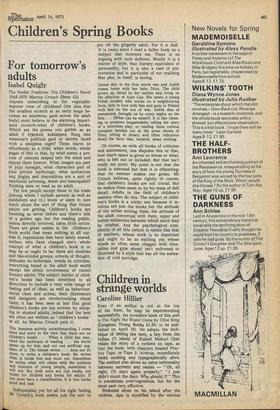For tomorrow's adults
Isabel Quigly
The Nesbit Tradition: The Children's Novel 1945-1970 Marcus Crouch (Benn £3) Anyone subscribing to the vegetablemarrow view of childhood (the idea that the smallest scratch at an early stage becomes an enormous gash across the adult body) must believe in the alarming importance (scratch-wise) of children's books. Which are the poems you gabble as an adult if hijacked, kidnapped, flung into someone's political gaol or merely faced with a sleepless night? Those learnt so effortlessly as a child, when words, whale pages of this or that, by what seems a process of osmosis seeped into the mind and stayed there forever. What images are part of your eyesight, what characters part of Your private mythology, what quotations and jingles and inspirations are a sort of emotional tattooing, dense and inescapable? Nothing seen or read as an adult.
Yet few people except those in the trade (among whom I include parents as well as publishers and co.) know or seem to care much about the sort of thing that future adults are getting. Children's books are booming as never before and there's talk Of a golden age, but the reading public, unless directly involved, takes little notice. There are great names in the children's book world that mean nothing at all outside it, reputations that have lately soared, writers who have changed one's whole concept of what a children's book is or May be or ought to be; there are rivalries and like-minded groups, schools of thought, attitudes to technique, trends in criticism, everything found in the adult book world except the direct involvement of (most) literary adults. The subject matter of children's books has been stretched in all directions to include a very wide range of feeling and of ideas, as well as behaviour, social class and action; their illustrators and designers are revolutionising visual taste; it has been seen at last that good Children's books are not written by stooping or stunted adults, indeed that the best are often not written as ' children's books ' at all. As Marcus Crouch puts it: This immense activity notwithstanding, I come more and more to the view that there are no Children's books . . . When a child has mastered the technique of reading . . . the world Opens up for him, and not one artificial segment of it. The honest writer . . . does not sit down to write a children's book. He writes What is inside him and must out. Sometimes he writes what will chime with the instincts and interests of young people, sometimes it will not. But both sorts are just books, not books for children and books for adults. If You must have a classification, it is into books good and bad.
Indisputable; yet for all his right feeling Mr Crouch's book seems just the sort to put off the gingerly adult. For it is dull. It is years since I read a duller book on a subject that interests me. There is no arguing with such dullness. Mostly it is a matter of style, that literary equivalent of personality, but it is also a case of presentation and in particular of not realising that plot, in itself, is boring.
Carew dies in the first world war and Judith comes home with her baby Dilys. The child grows up, hated by her mother and living on the affection of Aunt Liss. She meets a young Polish student who works on a neighbouring farm, falls in love with him and goes to Poland with him on the eve of war. Judith dies of pneumonia, brought on by crazy nights on the hills . . . [What can be mean?]. It is like listening to someone longwindedly telling the story of a television play, or reading those curious synopses handed out at the press shows of films, telling in dreary and often ridiculous detail the facts that, isolated, mean nothing.
Of course, as with all books of criticism and assessment, one disputes this or that, how much space is given to whom or what, who is left out or included. But that isn't really my point. My point is not that the book is unsound but that it is offputting; that its manner makes one groan. Mr Crouch believes, quite rightly of course, that children's books are not trivial. But he makes them seem so by his mass of dull detail. Adults in the field of children's matters often do this. The subject of children's books is a tricky one because it involves not just •the books but the attitude of the writer writing them, the attitude of the adult concerned with them, upper and nether millstones between which much may be crushed. And the psychological complexity of all this (which is rather like that of teachers, whose work is so important and ought to be so exciting yet whose minds so often seem clogged with timetables and gym shoes) isn't enlivened or illumined by a style that has all the animation of cold porridge.


































 Previous page
Previous page